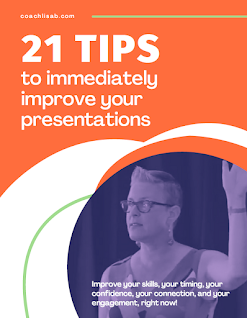Audience's facial expressions affect our language
 BPS Research Digest recently published an article on how the facial expression of a listener affects the way the speaker uses language. Here's an excerpt:
BPS Research Digest recently published an article on how the facial expression of a listener affects the way the speaker uses language. Here's an excerpt:"Audiences differ. Talk to one person and your words are welcomed by a smile and nod of acknowledgment. Speak to another, less winsome listener and your words are confronted by a frown and folded arms. According to Camiel Beukeboom, these different responses systematically alter your use of language. Speak to a positive listener and you'll likely use more abstractions and subjective impressions, whilst if you talk to a negative listener you'll probably find yourself sheltering in the security of objective facts and concrete details."
I find that I do work harder to prove my points when audience members looks skeptical or closed-minded; when the audience appears to be "with me," smiling, nodding, accepting, I tend to go in a more emotional direction. I'm curious now to observe my future presentations more closely for the above-mentioned phenomenon.
Have you ever experienced this -- consciously -- as a speaker?
Read the full article here.
____________________________________________________
On The Everything Page you'll find everything you need to build visibility, credibility and influence through engaging presentations that move your participants into action: freebies, low-cost products and courses, and 1:1 coaching!



4 comments. Please add yours! :
Lisa,
Do I do this when speaking with a group? Not sure, but it seems to make sense that I would. Sort of reminds me of the "mirroring" technique learned many years ago in an early communications course.
Hi Lisa
I think a lot of it comes down to how different audience members take in information. Eg a visually orientated person might look away to access an image in their minds eye which you are helping them create. When I was an actor I realised that people often frown in concentration - but they were the ones taking in every word. That certainly helped me look beyond the inital expression of individual audience members. Having said all that, I expect speakers do vary their language to fit the reaction they see - if you don't take notice of your audience then you'll end up as toast!
Completely agree it is essential to be constantly reading the body language of your audience and adjusting to engage each member if you want to make a difference. Need to take care no to be too distracted y the one who is disengaged to the detriment of the others. Askthem an inviting question often brings them back, but also risks derailment. Success is a fine line- it depends to some extent to how important the disengaged few are. If they are your decision makers or key stakeholders need to adjust, if not go with the positive flow.
Arthur tweeting as Metaphorage
Thanks for your comments, everyone! Regarding the expression on the audience's faces: I wrote this blog post a while back about how you can't judge a person's engagement by their body language: http://tinyurl.com/pxrx42.
However, I think there is something subconscious at work here. It's always important to pay attention to your audience's reactions. And interesting to notice if your own reaction is appropriate!
Post a Comment